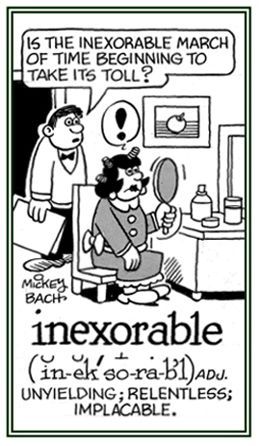aborad
1. Away from the mouth or oral region.
2. The opposite of orad.
Pertaining to something opposite to, away from, or distantly remote from the mouth: Dale held his fork in an aboral position waiting for the food on it to cool enough to put into his mouth.
adorable
(adjective), more adorable, most adorable
1. Charming, lovable, and usually very attractive: Little Mary thought her little kitten was so cute and adorable.
2. Etymology: from French adorer, "to adore, to worship"; from Latin adorare, "to speak to, to entreat, to ask in prayer, to worship"; from ad-, "to" and orare, "to speak, to pray".
adorably
(adverb), more adorably, most adorably
Expressing how an individual does something in a charming and pleasing way: Jack always looked at his wife adorably even after ten years of marriage.
Relating to the location near the mouth of an organism; pertaining to the direction toward the mouth: In the story Peter was reading the magic bird had adoral marks near its beak which shone brilliantly when it chirped in the morning.
adoration
1. A feeling of profound love and admiration.
2. Worship given to God alone.
3. The act of strongly admiring.
adore
(verb), adores; adored; adoring
1. To love someone intensely; to regard with deep, often rapturous love: Even though they were married for five years, Jack and Jill still
adored each other like in the very beginning of their relationship!
2. To like something or someone very much: Naomi just
adored her little kitten and gave it little treats to eat.
Mary loved to go to her grandmother's home because she adored the chocolate cupcakes her grandmother always made!
3. To worship God, a god, or a spirit: The church members in the village all adored the Supreme Being and prayed every day.
4. Etymology: from Old French aourer, "to adore, to worship"; from Latin adorare, "to speak to, to entreat, to beseech, to ask in prayer, to worship"; from ad-, "to" and orare, "to speak, to pray".
adorer
1. Someone who regards another person with deep, often rapturous love.
2. Anyone who likes someone, or something, very much.
3. A person who likes or admires something, someone, or groups, very much.
adoringly
Characterized with loving admiration and devotion.
deosculate
(verb), deosculates; deosculated; deosculating
To kiss affectionately or warmly: Whenever Eve's little children came home from school, she would hug them and deosculate each one because she was so glad to have them back with her again.
exorable
(adjective), more exorable, most exorable
1. Susceptible of being moved by entreaty and being pitiful: Little Ivy's crying and sad eyes were so exorable that her mother cooed and held her lovingly.
2. Etymology: from Latin exorabilis, "easily moved by entreaty"; from exorare, "to move by entreaty, to persuade"; from ex-, "out, away" and orare, "to pray".
exosculate
(noun), exosculates; exosculated; exosculating
To kiss; especially, to kiss repeatedly or with fondness.
inexorable
(adjective), more inexorable, most inexorable
1. Descriptive of something that is impossible to stop or to prevent: When people get older, it is
inexorable or inevitable that they will not have the same energy and capabilities as they did when they were younger.
2. A reference to a person who is adamant and pitiless; unyielding: Mildred was someone who was quite stubborn and
inexorable, and not moved by anyone's attempts to plead or have her change her mind.
 © ALL rights are reserved.
© ALL rights are reserved.
Go to this Word A Day Revisited Index
so you can see more of Mickey Bach's cartoons.
inexorably
(adverb), more inexorably, most inexorably
Concerning how something continues without any possibility of being stopped: The tornado or twister was raging and advancing
inexorably towards the little village.
Each day moves on inexorably to the next day, and each month proceeds inexorably to the next month.
inosculate
(verb), inosculates; inosculated; inosculating
To join and blend with something else, or to join or blend one thing with another: Sometimes doctors
inosculate a patient's blood vessels, nerve fibers, or ducts with small openings so he or she can physically function better.
Dr. Brown was surgically inosculating the blood vessels of the patient in order for her to recover from her lack of freely flowing blood in her legs.
Cross references of word families related directly, or indirectly, to:
"talk, speak, speech; words, language; tongue, etc.":
cit-;
clam-;
dic-;
fa-;
-farious;
glosso-;
glotto-;
lalo-;
linguo-;
locu-;
logo-;
loqu-;
mythico-;
-ology;
-phasia;
-phemia;
phon-;
phras-;
Quotes: Language,Part 1;
Quotes: Language, Part 2;
Quotes: Language, Part 3;
serm-;
tongue;
voc-.
A cross reference of other word family units that are related directly, indirectly, or partially with: "opening, hole, cavity, tract, tube":
alveolo-;
antro-;
anu-;
celo-;
coelio-;
concho-;
fenestra-;
hernio-;
hiat-;
meato-;
parieto-;
poro-;
pyl-, pyle-;
pylor-;
sphinctero-;
splanchn-;
stomato-;
syringo-;
uretero-;
urethro-;
vagino-;
ventricul-.


